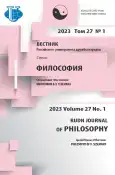Национальное самоопределение: особенности эволюции и функционирования феномена
- Авторы: Санакоев И.Б.1, Кулумбегова Л.Т.1, Ивлева М.Л.2
-
Учреждения:
- Юго-Осетинский государственный университет им. А.А. Тибилова
- Российский университет дружбы народов (РУДН)
- Выпуск: Том 27, № 1 (2023): ФИЛОСОФИЯ В.Э. СЕЗЕМАНА
- Страницы: 153-162
- Раздел: НАУКА, ФИЛОСОФИЯ, РЕЛИГИЯ
- URL: https://journal-vniispk.ru/2313-2302/article/view/325286
- DOI: https://doi.org/10.22363/2313-2302-2023-27-1-153-162
- EDN: https://elibrary.ru/QVENEK
- ID: 325286
Цитировать
Полный текст
Аннотация
Статья посвящена исследованию феномена национального самоопределения в плане эволюции и функционирования с момента его возникновения до наших дней. Авторы ставят своей целью определить общие характеристику и эволюцию этого феномена как в концептуальном, так и в прикладном варианте. В контексте эволюции национального самоопределения как теоретического концепта и политико-правового принципа было выделено и рассмотрено несколько этапов. По мысли авторов, каждый этап эволюции данного феномена неизбежно сопровождался его качественными трансформациями, как в политическом, так и в правовом плане. Первый этап (период конца XVIII в. и до Первой мировой войны), по мнению авторов, характеризуется зарождением идеи и формированием социально-политического концепта национального самоопределения, а в прикладном аспекте феномен национального самоопределения начинает наполняться конкретным содержанием на базе все расширявшейся политической практики его применения. Для второго этапа (период Первой мировой войны и последовавшее за ней послевоенное переустройство мира) характерно то, что национальное самоопределение из социально-политического концепта превратилось в политический принцип. Третий этапа эволюции национального самоопределения (после Второй мировой войны) авторы связывают с развитием международных отношений и формированием биполярной системы мира. Национальное самоопределение превратилось в принцип позитивного международного права, который закладывал основы для будущей политической нестабильности новых независимых государств. Наконец, последний период (начало 90-х гг. до наших дней) характеризуется поиском и кристаллизацией новых подходов к принципу национального самоопределения и появлением новых теорий, авторы которых пытаются с политико-правовой точки зрения обосновать правомерность расширительного толкования данного принципа. Анализ позволил заключить, что представленные в статье качественные трансформации принципа национального самоопределения так и не привели к формированию феномена национального самоопределения как целостной, завершенной и общепризнанной международно-правовой нормы.
Об авторах
Инал Борисович Санакоев
Юго-Осетинский государственный университет им. А.А. Тибилова
Автор, ответственный за переписку.
Email: inal59@mail.ru
ORCID iD: 0000-0003-4390-1012
кандидат политических наук, профессор, заведующий кафедрой политологии и социологии
Республика Южная Осетия, 500200, Цхинвал, ул. В.В. Путина, д. 8Лина Темуриевна Кулумбегова
Юго-Осетинский государственный университет им. А.А. Тибилова
Email: linakulumbegova@mail.ru
ORCID iD: 0000-0001-8096-654X
старший преподаватель кафедры политологии и социологии
Республика Южная Осетия, 500200, Цхинвал, ул. В.В. Путина, д. 8Марина Левенбертовна Ивлева
Российский университет дружбы народов (РУДН)
Email: ivleva_ml@pfur.ru
ORCID iD: 0000-0003-2901-7503
доктор философских наук, профессор, заведующий кафедрой социальной философии
Российская Федерация, Москва, 117198, ул. Миклухо-Маклая, д. 6Список литературы
- Tsutsiev AA. Territories of problematic sovereignty. Scientific notebooks of the Institute of Eastern Europe. 2006;(1):28-52. Available from: http://www.academia.edu/24013827/28-52 (accessed: 12.02.2018). (In Russian).
- Tashiyan AA. Ethnocratic aspects of the realization of the right of nations to self-determination in modern Russia. [dissertation]. Rostov-on-Don; 2004. Available from: http://www.dissercat.com/content/etnokraticheskie-aspekty-realizatsii-prava-natsii-na-samoopredelenie-v-sovremennoi-rossii (accessed: 06.11.2017). (In Russian).
- Smolovaya ES. The right of peoples to self-determination. Young scientist. 2015;(7):598-605. Available from: https://moluch.ru/archive/87/16796/ (accessed: 07.11.2017). (In Russian).
- Mutagirov JZ. Lenin’s concept of the right of peoples to self-determination and world development in the twentieth century. Proceedings of the Vtoraja ezhegodnaja Mezhdunarodnaja nauchno-prakticheskaja konferencija “Lenin VI. v sovremennom mire”; 2008 apr 22; Razliv. Available from: http://leninism.su/lenin-now/4185-lenin-v-sovremennom-mire-2008.html?showall=&start=12 (accessed: 07.11.2017). (In Russian).
- Aleksanyan SR. The principle of equality and self-determination of peoples in modern international law. [dissertation]. Moscow; 2017. Available from: https://mgimo.ru/upload/diss/2017/Aleksanyan_diss.pdf (accessed: 18.12.2017). (In Russian).
- Merezhko AA. Who has the right to self-determination in Crimea? Available from: http://www.forumdaily.com/kto-imeet-pravo-na-samoopredelenie-v-krymu/ (accessed: 07.11.2017). (In Russian).
- Zohrabyan RP. The principle of equality and self-determination of peoples: the evolution of the content in the system of principles of international law. Vestnik Moskovskogo universiteta. Serija 11: Pravo. 2009;(2):61-73. (In Russian).
- Timoshev RM. The right of nations to self-determination and modern interethnic conflicts. Available from: https://cyberleninka.ru/article/n/pravo-natsiy-na-samoopredelenie-i-sovremennye-mezhnatsionalnye-konflikty (accessed: 24.08.2017). (In Russian).
- Cheshko SV. The crisis of the doctrine of self-determination. Available from: http://histrf.ru/biblioteka/book/krizis-doktriny-samoopriedielieniia (accessed: 07.11.2017). (In Russian).
Дополнительные файлы









